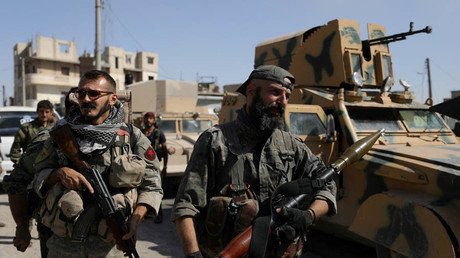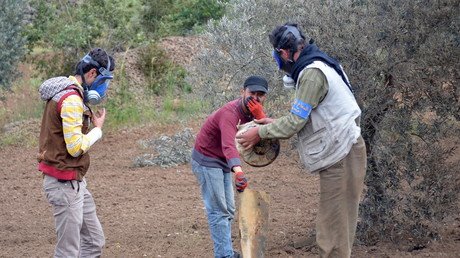'What right does the US have to defend illegal formations in Syria?'
Whatever President Trump said earlier about fighting ISIS, the real US mission in Syria now is to block the Iranians and to look at Assad as simply an Iranian puppet, former US diplomat Jim Jatras told RT.
The US-led coalition conducted airstrikes against pro-government forces in Syria on Wednesday, which US Central Command described as a "defensive" measure in retaliation for what they called an “unprovoked” attack on the so-called Syrian Democratic Forces (SDF) and foreign military “advisers.”
“In defense of coalition and partner forces, the coalition conducted strikes against attacking forces to repel the act of aggression against partners engaged in the global coalition’s defeat-Daesh (Islamic State, IS, formerly ISIS) mission,” the Central Command said in a press release.
The SDF is an alliance of militias in northern Syria. It is mostly Kurdish and has received continued support from the United States.
RT America’s Ed Schultz discussed this direct confrontation between the US and pro-Syrian government forces with former US diplomat Jim Jatras.
RT: How does this complicate things?
Jim Jatras: It complicates things very much. Not only does it put us potentially in an American conflict with Syrian government forces, but since those are allied with the Russians, also the Iranians, conceivably directly confronting those countries as well.
RT: Does this make a statement about American policy that we're not done with Assad
JJ: I think it certainly does. And I think Secretary Tillerson has been talking that way in recent weeks, and it really begs the question Donald Trump ran on ‘We're going to destroy ISIS.’ ISIS is virtually eliminated in Syria, so what is our American force doing there? What is their mission? I don't think that's clear, neither is it clear what their legal authority is.
RT: What about Turkey and Russia? What do you anticipate that their response will be to this?
JJ: Of course, the Turks are engaged in their own offensive against the so-called Syrian Democratic Forces, which are mostly Kurdish forces, that is primarily in a different part of Syria, further to the west, although they've also indicated they might move toward the main area where the Kurds are based. We don't really know exactly which forces were being targeted by the Syrian government here that the United States claimed we had to respond in self-defense – whether it was the Kurdish forces that the Turks are fighting against, or whether it was some other allied forces. Some of them, by the way, are former Al-Qaeda or ISIS types that have been reconfigured in something called a New Syrian Army.
So far, the Syrian government is still reluctant to enter into direct clashes with the US because the balance of powers is drastically to the favor of the US Army there. And, at the same time, the Syrian Army is fighting terrorist groups elsewhere in the country… But in the future, the Syrian government will deal with the US Army as an occupying force and there might be armed resistance to this occupation. - Jamal Wakeem, international relations professor at the Lebanese University
RT: President Trump has been quick to align himself with the Kurds, praising them by saying they've been the most loyal to the United States. Let's talk about this budget that is being approved in the Senate. Does this signal that there's going to be some resources to do more of this, if they have to?
JJ: Early on in Syria, one of the first things that Trump did is he cut off the CIA support for the Al-Qaeda-linked jihadist and threw all the support behind the Kurds, which are the Pentagon's client. And I think there's some internal bureaucratic politics going on here, that for whatever reason Donald Trump has decided the Pentagon and the Defense Department are his boys. Look, who domestically are the elements of the deep state that are trying to bring him down. So, I think he has planted his flag on that side. Whatever they want over, there they're going to get.
Americans aren’t just in Syria to fight (Islamic State or IS, formerly) ISIS, they’ve been in there for a long time because they want to overthrow [President Bashar] Assad. And as the specter of ISIS fades, as it becomes clear that Syrian forces themselves have largely defeated ISIS, the priority of overthrowing Assad begins to reassert itself in the Pentagon and in the White House. The overthrow of Assad was always the prime reason why the Americans were in Syria, arming and training these groups, intervening with airstrikes and so on. They were diverted from that by ISIS. Now with the possibility of defeat of ISIS inside Syria, that policy reasserts itself. – political analyst Chris Bambery
RT: Does this somewhat vindicate what Sergey Lavrov has said about the United States when it comes to dealing with them, the United States and cooperation in Syria?
JJ: I think in the sense that the Russians think, ‘We can't stick by a deal, we can't take yes for an answer.’ If our mutual goal, where both we and the Russians think ‘We have to destroy the terrorists, we have to destroy ISIS,’ then what exactly we are doing here.
RT: Is there a broader picture here that we're not seeing in some sense?
JJ: Sure, there is. Because what it all comes down to is - whatever early on President Trump said about fighting ISIS - the real mission now has nothing to do with ISIS. It is to block the Iranians and to look at Assad as simply an Iranian puppet, which of course is not true. But that's now clearly what the focus is of whatever amounts to a policy.
This is an aggression against the Syrian Arab Army and against the Syrian government. Because the US has no legitimate claim to have troops on Syrian soil. It claimed that it was fighting ISIS, but so far we never saw a single strike by the US against ISIS fighters, all strikes came against the Syrian Arab Army and its allies in an attempt to take hold of north eastern Syria and establish military bases there. - Jamal Wakeem, international relations professor at the Lebanese University
RT: What did you make of the fact that the coalition said the attack on the SDF headquarters was unprovoked? What does that mean?
JJ: Honestly, I think it's bizarre. You've got illegal formations fighting against the legitimate, internationally recognized government. Their very presence, the fact they're fighting against the government is a provocation. The government has a right to fight against those forces. What exactly does another country, in this case ours, illegally present on the territory of that country, what right do we have to claim to defend those illegal formations?














